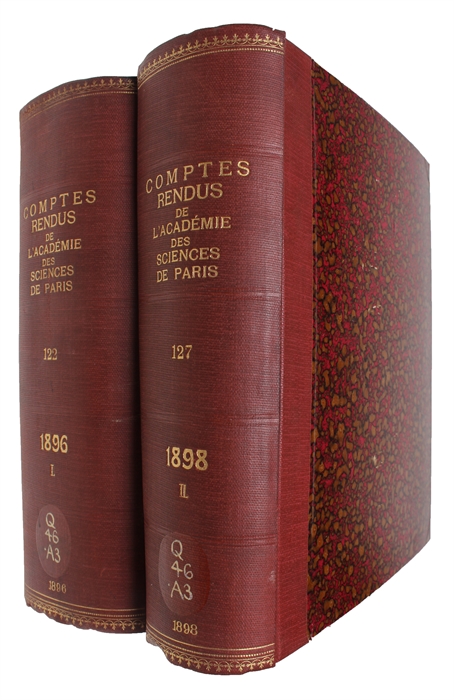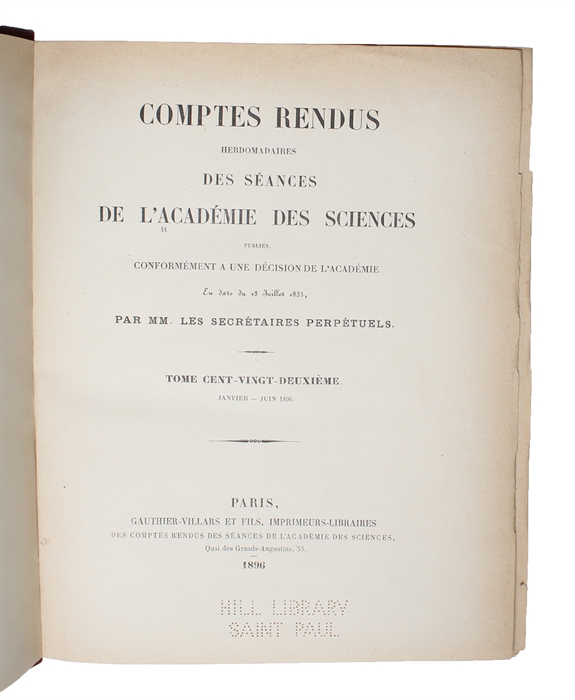BECQUEREL, HENRI., MARIE CURIE, PIERRE CURIE, GUSTAVE BÉMONT, EUGÈNE DEMARÇAY. - THE DISCOVERY OF RADIOACTIVITY, RADIUM & POLONIUM DISCOVERED.
(Nine papers documenting the discovery of radioactivity, the discovery of Radium and Polonium:) 1. Becquerel: Sur les radiations émises par phosphorescence. 2. Becquerel: Sur les radiations invisibles émises par les corps phosphorescents. 3. Becquerel: Sur quelques propriétés nouvelles des radiations invisibles émises par divers corps phosphorescents. 4. Becquerel: Sur les radiations invisibles émises par les sels d'uranium. 5. Becquerel: Sur propriétés differentes des radiations invisibles émises par les sels d'uranium, et du rayonnement de la paroi anticathodique d'un tube de Crookes. 6. Becquerel: Émission de radiations nouvelles par l'uranium métallique. 7. Marie Curie & Pierre Curie: Sur une substance nouvelle radio-active, contenue dans la pechblende 8. Marie Curie, Pierre Curie, Gustave Bémont: Sur une nouvelle substance fortement radio-active, contenue dans pechblende. 9. Eugène Demarçay: Sur le spectre d'une substance radio-active.
Paris, Gauthier-Villars, 1896 a. 1898.
4to. Bound in 2 contemp. hcloth, spines gilt and with gilt lettering. In: "Comptes Rendus Hebdomadaires des Séances de L'Academie des Sciences", Tome 122 a. 127. - 1633 pp. + 1302 pp. Both with halftitle and title-page. Title-pages with a punched stamp to lower margin. The papers (tome 122:) pp. 420-421, 501-503, 559-564, 689-694, 762-767, 1086-1088. (Tome 127:) pp. 175-178, 1215-1217, 1218. Internally clean and fine.
First appearance of the landmark papers in which Becquerel documents his discovery of Radio-activity, PROMPTING THE NUCLEAR AGE, and the papers which the Curies announced the discoveries of the 2 elements Polonium and Radium.
Becquerel was an expert in fluorescence and phosphorescence, continuing the work of his father and grandfather. Follwing the discovery of X-rays by Röntgen, Bexquerel investigated fluorescent materials to see if they also emitted X-rays. He exposed a fluorescent uranium salt, pechblende, to light and then placed it on a wrapped photographic plate.He found that a faint image was left on the plate, which he believed was due to the pichblende emitting the light it had absorbed as a more penetrating radiation.. However, by chace, he left a sample that had not been exposed to light on top of a photographic plate in a drawer. he noticed that the photographic plate also had a a faint image of the pechblende. After several chemical tests he concluded that these "Becquerel rays" were a property of atoms. He had, by chace, discovered radio-activity and prompted thee beginning of the nuclear age. He shared the Nobel Prize for Physics in 1903 with Marie and Pierre Curie. The "Becquerel Rays" were later discovered to be a composite of three forms of emanation, distinguished by Rutherford as alpha, beta and gamma rays.
Dibner: 163 (the later Mémoire from 1903) - PMM: 393 (1903- Mémoire) - Garrison & Morton: 2001 (only the first paper). - Magie "A Sourve Book in Physics" p. 610 ff. - Norman:157.
"The Curie's owned their success to an extremely sensitive electroscopic apparatus constructed by Pierre and his brother Jacques, which made possible a "new method of chemical analysis based on the precise measurement of radium emitted, a method still in use."(DSB).
Becquerel's discovery of the radioactive properties of uranium (1896) inspired Marie and Pierre Curie to investigate radiation. They reported their researches in a series of papers from 1897 in the Comptes rendus. First they isolated a new substance about three hundred times as active as radium. This they called Polonium in honour of Marie's native Poland. A further examnination of the residue of Pitchblende after the removal of uranium and polonium disclosed residual radio-activity far greater than was possessed by either substance alone. To this material the name Radium was given. The radium was found to be about two million times as radio-active as uranium.
Garrison & Morton: 2003. - Magie "A Source Book in Physics" p. 613 ff.
Order-nr.: 49475


